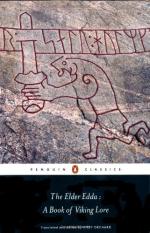|
This section contains 6,657 words (approx. 23 pages at 300 words per page) |

|
SOURCE: Kellogg, Robert. “Literacy and Orality in the Poetic Edda.” In Vox intexta: Orality and Textuality in the Middle Ages, edited by A. N. Doane and Carol Braun Pasternack, pp. 89-101. Madison: University of Wisconsin Press, 1991.
In the following essay, Kellogg explores the origins of the Elder Edda as oral poetry and its preservation in written manuscripts, including the prose adaptation of Snorri Sturluson.
The oldest vernacular literary texts that survive from medieval Europe are the products of two cultures. First, they are marked by the characteristics of oral-formulaic composition, pointing back to origins in preliterate societies. But they are also the products of literacy, coming to us as they do in written manuscripts. In some cases, such as the text of Beowulf or of Hildebrandslied, scholarly convention has proposed a period of two or three hundred years as the probable time between an “original” composition of the...
|
This section contains 6,657 words (approx. 23 pages at 300 words per page) |

|


